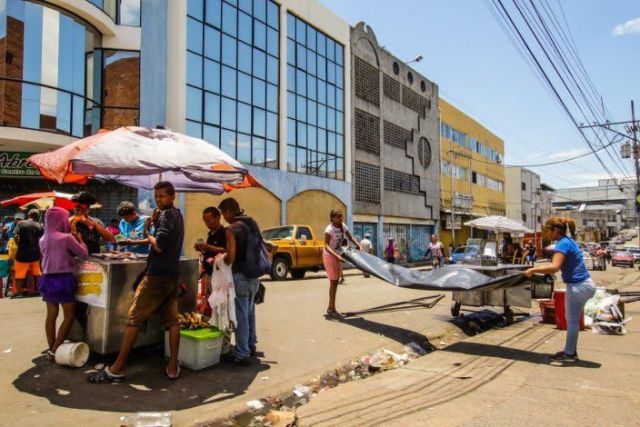
“If you want it without an invoice, it will cost you less”; “without the invoice you will not be charged VAT”; “will you want an invoice?”, these are some of the many phrases that a customer can hear in any store. In other cases, stores do not even give the option of a legal invoice, since the establishments do not have “fiscal machines”, among other requirements, to issue them.
Pableysa Ostos // Correspondent lapatilla.com
The lapatilla.com team spoke with a source from the Superintendence of Tax Administration of the Caroní Municipality, as well as representatives of the chambers of commerce to find out their position on this issue.
The source of the Superintendency in Ciudad Guayana stated that there are some 1,000 insolvent taxpayers “despite the fact that an investment was made in carrying out a census of economic activities, which updated the taxpayer register between the months of April and July of the year 2022. Taxpayers were repeatedly ordered to catch up with their tax and administrative obligations. Since August 2022, they have received countless text messages, phone calls, and emails reminding them their accounts status, and to date they continue to owe their legal obligations.”
Eliminate obstacles
The President of Fedecámaras-Bolívar (Federation of Chambers of Commerce of Bolivar Sate), Austerio González, stressed that the Venezuelan businessman and merchant, by nature, has been characterized by complying to the payment of taxes.
“What is happening in Caroní is different. The problem is not that the businessman does not want to pay his taxes, but rather that the mayor’s office in some way entangled the payment of the economic patent or the payment of the license or economic activity, because first you must pay the public services in order to be permitted to pay the taxes. In order to carry out economic activity and pay that tax, they force you to pay a public service, and that is where the contradiction comes in.”
The business representative affirmed that the payment of urban cleaning (trash collection) cannot be prioritized over the payment of the patent or the license for economic activity, since these are two very different matters.
“The main thing is the payment of the municipal license. No merchant refuses to pay taxes, but you create obstacles for me by forcing me to pay for a service, which costs are very high and are not appropriate for the business sector of Bolívar State,” stated the President of Fedecámaras.
González explained that among the actions they are carrying out to support their affiliates and comply with their tax obligations is the creation of a technical assistance committee.
“That technical table is somehow looking for the most appropriate and expeditious way to make the modification of the ordinance based on the use of a methodology that adjusts the costs of solid waste collection to the production (of waste) by each business” .
For his part, the spokesperson for the municipality highlighted that the Mayor of Caroní, Tito Oviedo, “in order to optimize the collection processes of the municipality, the mayor’s office held previous meetings with the representatives of the different trade unions and associations of the productive sector of Ciudad Guayana where different proposals arose, among which is the forgivance of fines and accrued interest for some taxpayers.
Businesses close down
The unions calculate that around 420 businesses closed between November 2022 and April 2023 of the 10,876 that were economically active in the Caroní Municipality.
The Vice President of Fedecámaras in Bolívar, David Bermúdez, explained that: “we continue to see that businesses keep closing, especially the smaller ones, since their income does not even come to 2,000 dollars (a month).”
When asked whether these businesses have closed pushed by the costs of public services, such as urban cleaning (trash collection), or tax payments, Bermúdez affirmed that very few have closed forced by the Fospuca (trans collection company) issue.
“The media effect has been bigger than the number of closed businesses, while closures caused by the mayor’s office amount to no more than 10 companies. In the case of the closures forced by mayor’s office dues, we initially thought that these were caused by the issue of Fospuca’s payment, but the truth is that there were previous tax commitments that had not been honored, and those were what the mayor’s office was demanding.
What to do if someone closes their business?
If a company for any reason must close its doors, it is important that it notify the municipal authorities so that it does not become delinquent with its tax obligations.
Article 9 literal g of the “Partial Reform of the Tax Ordinance on the Economic Activities of Industry, Commerce, Services and its Classifier of Economic Activities” promulgated on September 9th, 2020, establishes the obligation to notify the cessation of economic activities within the municipality, as well as the causes that originate it.
While article 11 of the aforementioned legal instrument authorizes and attributes the Municipal Tax Administration to carry out the corresponding steps to regularize the current situation of taxpayers.
“As long as the taxpayer does not notify and complies with the established requirements for the formal cessation of his economic activities to be accredited, it continues within the universe of delinquent taxpayers and, therefore, the Superintendency of Taxes, can at any time exercise the right to the collection of what is owed,” highlighted the source.